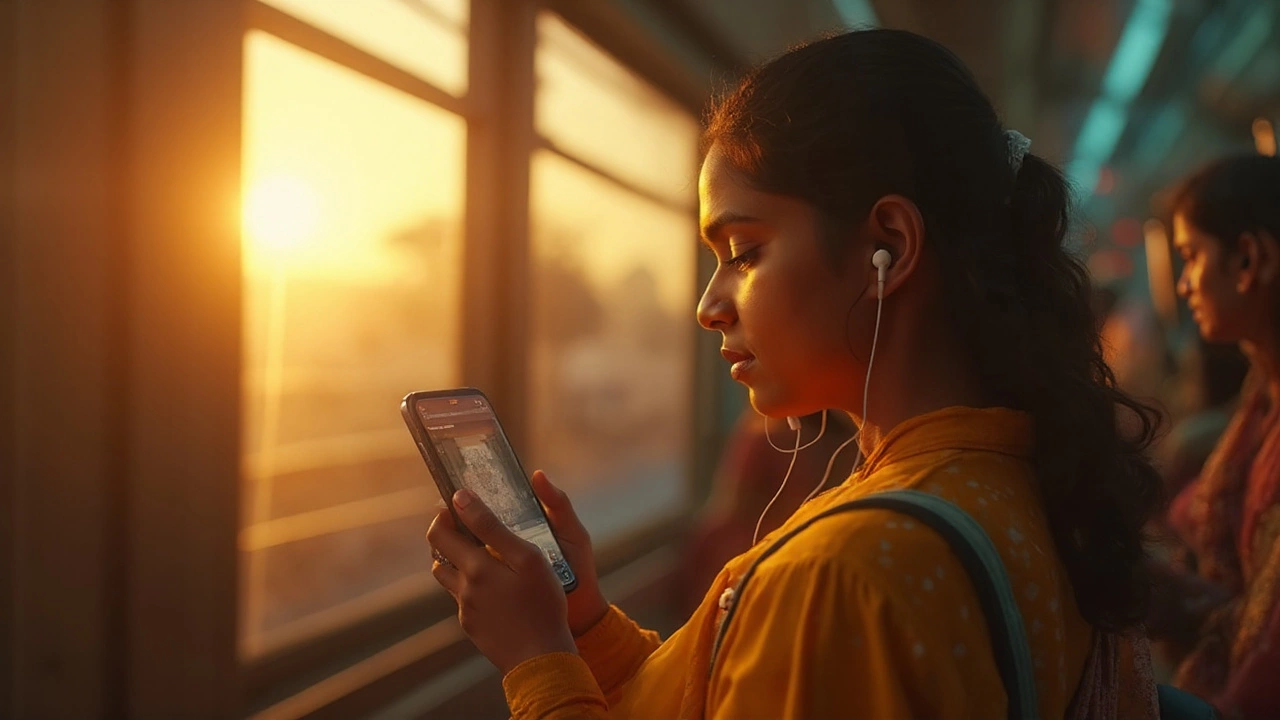If you clicked this, you want something simple: a free app that actually makes you speak English-and speak it better. Here’s the truth: there isn’t one magic app that does everything. But there is a short list that, combined, covers real conversation, pronunciation, and daily consistency without forcing you to pay.
TL;DR
- The best free app for speaking English depends on your goal: real conversations (HelloTalk/Tandem), pronunciation (ELSA/Cake), daily routine (Duolingo), coach feedback (Speechling).
- Zero-cost starter stack: HelloTalk (talk to people) + Cake (shadow videos) + Speechling free (daily voice feedback) + Duolingo (habit and vocab).
- Do 20 minutes daily: 5 mins shadowing, 5 mins pronunciation drills, 5 mins voice notes with a partner, 5 mins recap monologue.
- Results come from speaking out loud, recording yourself, and getting feedback-not from tapping multiple-choice.
- Safety: use built-in moderation, don’t share personal info, and block/report bad actors. Your voice, your rules.
The best truly free ways to practice speaking in 2025
When people ask me which free app to use, they usually mean one of three jobs-to-be-done: talk to real humans, get pronunciation right, or build a daily habit. Here’s how the top free options map to those jobs. I live in Cape Town, so I also keep data costs and patchy Wi‑Fi in mind.
- HelloTalk (iOS/Android): Free language exchange. Text, voice notes, and calls with native speakers. Built-in corrections. Great for real, messy, human conversation. VIP is optional; free plan is enough to start.
- Tandem (iOS/Android): Similar to HelloTalk with better matchmaking and topic prompts. Free plan includes messaging and audio; pro is optional.
- Lingbe (iOS/Android): Tap a button, talk to someone now. You earn minutes by helping others. It’s the fastest path to live speaking without paying.
- Speaky (iOS/Android/Web): Simple, big community. Good for quick voice calls and voice notes. Not as polished as Tandem, but free works.
- Cake (iOS/Android): Short video clips, shadowing lines, and AI pronunciation scoring. Free with ads. Extremely good for fluency rhythm-repeat after natural speakers.
- ELSA Speak (iOS/Android): Laser-focused on pronunciation with phoneme-level feedback. Free plan gives limited daily lessons, which is enough if you’re consistent.
- Speechling (iOS/Android/Web): Record yourself; get coach feedback. Free plan allows limited corrections daily. It’s rare to get real human feedback for free-use it.
- Duolingo (iOS/Android/Web): For habit and vocabulary. Its speaking exercises are basic, but it keeps you consistent. Free with ads; Super is optional.
- BBC Learning English (iOS/Android/Web): High-quality audio/video lessons, transcripts, and pronunciation guides. No ads, no fluff, and trusted by teachers.
- TalkEnglish (Android/Web): Old-school, huge library of dialogues and speaking drills. Not pretty, but useful and free.
Quick decision guide:
- If you want real conversations today: HelloTalk or Tandem. If shy, start with voice notes before live calls.
- If you want pronunciation to sound clearer: ELSA for phonemes; Cake for intonation and natural speed.
- If you hate studying: Cake videos + Lingbe’s instant calls. Keep it fun and fast.
- If money is tight: Duolingo (habit) + Cake (shadowing) + HelloTalk (voice notes) + Speechling free (coach feedback).
- If your internet is unstable (hello, Cape Town load shedding): download BBC audio, use ELSA offline lessons, and send voice notes instead of calls.
Feature snapshot (2025):
| App | Core strength | Free plan limits (2025) | Speaking mode | Best for | Platforms | Offline support |
|---|---|---|---|---|---|---|
| HelloTalk | Human conversation | Messaging/voice free; VIP for extras | Voice notes, calls | Real-world chat | iOS, Android | No (messages cache) |
| Tandem | Partner matching | Free messaging/calls; Pro optional | Text, voice, video | Guided exchanges | iOS, Android | No |
| Lingbe | Instant calls | Earn minutes by helping | Live audio calls | Quick practice | iOS, Android | No |
| Speaky | Large community | Most features free | Voice notes/calls | Casual practice | iOS, Android, Web | No |
| Cake | Shadowing clips | Free with ads | Repeat-after-me + AI scoring | Fluency & intonation | iOS, Android | Partial downloads |
| ELSA Speak | Pronunciation | Daily lessons limited | Phoneme-level feedback | Clearer sounds | iOS, Android | Some lessons offline |
| Speechling | Coach feedback | Limited daily corrections | Record & review | Targeted fixes | iOS, Android, Web | Partial |
| Duolingo | Habit & vocab | Free with ads | Basic speaking prompts | Consistency | iOS, Android, Web | Some lessons offline |
| BBC Learning English | Quality content | Fully free | Listen & mimic | Authentic English | iOS, Android, Web | Yes (downloads) |
| TalkEnglish | Structured dialogues | Free | Read, speak, compare | Beginners | Android, Web | Limited |
Why this list? Because each app attacks a different bottleneck: motivation (Duolingo), real speech (HelloTalk/Tandem), sound accuracy (ELSA), natural rhythm (Cake), and feedback (Speechling). Mix two or three, and you’ve built a complete speaking practice without paying.
Credibility check: British Council teacher guides recommend “shadowing”-repeating after audio-to build fluency and reduce processing time. Duolingo’s annual reports show high daily engagement, which is why it’s good for habit. ELSA’s published materials explain their phoneme-level scoring, which is exactly what learners need for stubborn sounds like /θ/ and /ð/.

How to use these apps to actually get fluent (step-by-step)
You don’t need hours. You need consistency and a plan. Here’s a simple 20-minute routine I use (often while walking along Sea Point):
- Shadowing warm-up (5 minutes) - Cake or BBC
- Pick a 30-60 second clip.
- Listen once. Then play it again and repeat every line out loud, matching speed and emotion.
- Final pass: speak along with the speaker, same time-like singing along.
- Pronunciation drill (5 minutes) - ELSA
- Target problem sounds: “th”, “r/l”, vowel length (ship/sheep), or ending consonants.
- Record, check the phoneme feedback, repeat until you hit green.
- Pro tip: exaggerate your mouth shape for 30 seconds; natural speech will still sound normal but clearer.
- Real output (5 minutes) - HelloTalk/Tandem voice notes
- Choose a prompt: “My morning routine,” “A small problem I solved today,” or “What surprised me this week.”
- Record a 60-90 second voice note and send it to a partner.
- Ask for one request: “Please correct my pronunciation of ‘comfortable’ and ‘vegetable’.”
- Recap monologue (5 minutes) - Any recorder/Speechling
- Record yourself summarizing the clip you shadowed or the chat you had.
- Listen back once. Note one pronunciation fix and one fluency fix (e.g., reduce “uh/um”; link words).
- Upload to Speechling free for coach feedback when available.
Weekly plan (four weeks):
- Week 1: Build rhythm. Daily Cake shadowing + ELSA basics. Send one 60-second voice note every other day.
- Week 2: Add conversation. One 10-minute call on Lingbe or Tandem midweek. Keep shadowing daily.
- Week 3: Topic depth. Pick one theme (travel, work, sports). Learn 15 key phrases in Duolingo/TalkEnglish. Use them in voice notes.
- Week 4: Pressure test. Do a 3-2-1 drill: talk about a topic for 3 minutes, then 2, then 1-each time smoother, faster, clearer.
Techniques that move the needle:
- Shadowing with linking: Practice connecting words (“going_to”, “kind_of”, “want_to→wanna”). It makes you sound fluent faster than memorizing new vocab.
- Minimal pairs: ship/sheep, live/leave, thin/then. ELSA and Speechling both cover these. Five minutes a day knocks out fossilized errors.
- Voice notes over text: Text lies about fluency. Voice shows the truth and gets you help on rhythm and stress.
- Micro-goals: Not “speak better.” Try “reduce ‘uh’ to under three times per minute” or “hit all past tense endings today.”
- Accent choice: Pick a target-US, UK, or a global neutral accent. Consistency helps your ear and mouth align.
If you’re nervous about speaking, start private:
- Record on Speechling privately. Get feedback, build courage.
- Switch to voice notes on HelloTalk. You can re-record before sending-low pressure.
- Then schedule a 5-minute live call. Keep a “cheat sheet” of phrases on your screen.
Data and battery tips (from someone who’s been burned mid-call during load shedding):
- Use Wi‑Fi and download BBC/Cake lessons in advance.
- Prefer voice notes over live calls if signal is weak.
- Disable video during calls; audio is enough for speaking practice.
Safety and privacy:
- Never share your full name, address, or financial info. Use in-app calls only.
- Block/report anyone who ignores your boundaries. The best partners respect time and corrections.
- Set clear goals in your bio: “Voice notes preferred, 10-minute calls, please correct pronunciation.” It filters the right people.

Quick picks, checklists, and FAQs
Here’s the no-nonsense part: what to pick fast, what to check before you invest time, and answers to the usual questions I get from readers.
Quick picks by situation:
- Beginner and shy: Cake + Speechling free + HelloTalk voice notes only.
- Intermediate, wants real talk: Tandem/HelloTalk live calls 2x/week + ELSA for targeted fixes.
- Pronunciation makeover: ELSA 5-10 mins/day + minimal pairs + BBC downloads.
- No time (parents, shift workers): 2 voice notes/day (90 seconds each) + 1 clip shadowed.
- Bad internet: Offline BBC + ELSA offline + voice notes when connected.
Checklist: how to judge a “free” speaking app
- Can I speak out loud daily without paying (voice notes or drills)?
- Does it give feedback (AI or human) beyond “right/wrong”?
- Is there real conversation (people or realistic dialogues)?
- Can I download lessons or practice offline?
- Is my data and identity protected? Clear block/report tools?
Pitfalls to avoid:
- Endless scrolling. If you aren’t speaking out loud, you’re not practicing speaking.
- Waiting for a perfect partner. Send a voice note today; perfection comes later.
- Chasing too many apps. Use two or three well. Delete the rest from your home screen.
- Ignoring feedback. Keep a mini list: three pronunciation fixes, three filler words to reduce.
Mini-FAQ
- Is there a single best free app? No. Use one for conversation (HelloTalk/Tandem), one for pronunciation (ELSA/Cake), and one for habit/feedback (Duolingo/Speechling).
- Are AI chatbots enough? They’re helpful, but you still need human ears sometimes. AI can’t fully judge your intonation in messy, real settings.
- Can I get fluent with free tools only? Yes, if you speak daily and get feedback. Paid tutors speed things up, but they’re not mandatory.
- Which accent should I learn? Pick one model (US/UK/global neutral) and stay consistent for a few months. Consistency beats switching weekly.
- How long until I notice improvement? Most learners notice smoother speech in 2-4 weeks with daily shadowing and voice notes.
- Is Duolingo enough for speaking? It’s great for habit and vocab, but it won’t replace live conversation and pronunciation drills.
- What if I’m scared to make mistakes? Use Speechling privately for a week, then send short voice notes. Confidence grows with reps.
- What about kids or teens? Cake and BBC are safe starts. For live chat, supervise and use strict privacy settings.
Next steps and troubleshooting
- If you keep freezing in conversations: Prepare three “go-to” stories (1 minute each). Practice them with Cake’s shadowing rhythm, then record on Speechling. In chats, start with those stories to warm up.
- If your pronunciation doesn’t improve: Focus on one phoneme per week. ELSA → Speechling correction → 10 minimal pairs daily. Track progress in a note. Tiny wins add up.
- If you can’t find good partners: Update your bio with a schedule and topics. Message three people with a specific ask: “Swap 5 voice notes about travel today?” Quality beats volume.
- If time is your enemy: Stack practice onto habits. Shadow while making coffee; send a voice note while walking; recap before bed. Two 90-second voice notes daily are plenty.
- If you’re stuck at intermediate: Raise difficulty: speed up shadowing by 10%, cut filler words, and switch topics to problem-solving and opinions (e.g., “Should schools ban phones?”).
- If data is expensive: Download BBC audio at home, use ELSA offline, and stick to voice notes. In Cape Town, I keep a small offline library for load shedding days.
What I use most weeks: Cake (for rhythm), ELSA (to fix stubborn sounds), and Tandem voice notes (for real talk). When I want human feedback, Speechling’s free plan covers it. If Lana hears me practicing the same sentence ten times in the kitchen, that’s when she knows a tough sound is finally changing.
Pick two apps from this list and start speaking today. Keep it light, keep it daily, and record yourself often. Pay only if you hit a ceiling-and you might not need to.
